
6 July 2022
Welcome to this week's special edition of Check in as we celebrate NAIDOC Week.
NAIDOC Week celebrates and recognises the history, culture and achievements of Aboriginal and Torres Strait Islander peoples.
Meet some of our wonderful Aboriginal and Torres Strait Islander staff, and learn more about the incredible work happening across the state each and every day.
In this edition
-
Quick links
-
Aboriginal health workforce shines in COVID-19
-
Get involved
-
60 seconds with...
-
Protect your mob and bub this winter
-
Aboriginal artefacts uncovered
-
Art creating a tranquil space at Westmead Hospital
-
National Sorry Day and Reconciliation Week
-
NSW respiratory surveillance report
-
Excellence in Aboriginal Healthcare Award winners
-
Aboriginal Nurse of the Year
-
Quick news
-
Aboriginal Allied Health Professional of the Year
-
Multicultural resources
-
Improving chronic kidney disease care
-
New clinic tackling gap in Indigenous dental health
-
From the Critical Intelligence Unit
-
Quick links
Aboriginal health workforce shines in COVID-19
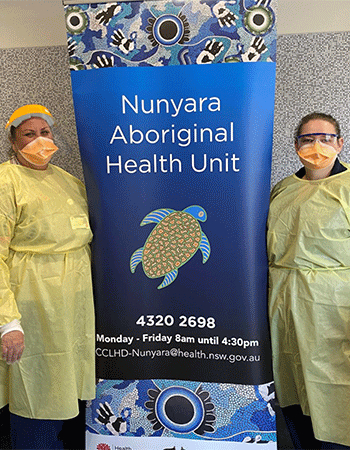
Our Aboriginal health workforce's dedication and tireless efforts during the pandemic kept our mob safe, with a concerted effort system wide to increase the vaccinations rates of Aboriginal people.
We were able to speak with some of our wonderful Local Health District (LHD) Aboriginal health staff about their role and the impact they had on their local community.
Sarah-Kathleen Collis is a proud Biripi woman who works at Central Coast LHD as a registered nurse.
During the COVID outbreak, Sarah was juggling her usual nursing demands, along with supporting vaccination clinics, and also volunteered to do contact tracing which proved to be very rewarding as she provided cultural support for those in isolation, as well as organising food and accommodation where needed.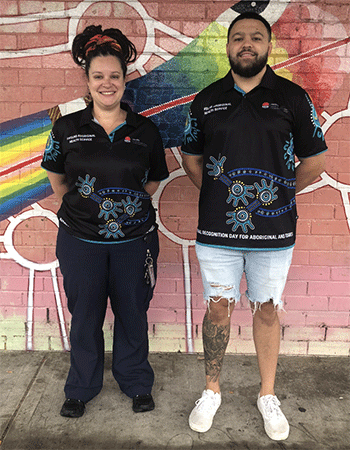
Sarah said, ‘Sometimes people would be a little scared fearing a positive COVID result but by having a good yarn I was able to put their mind at ease. For Aboriginal patients, being able to speak with another Aboriginal person at the same level made a world of difference. People felt safe and trusted what I had to say.’
In South Western Sydney Local Health District, Allira Blackburn was busy as an Aboriginal Health Practitioner delivering vaccination jabs to Aboriginal people at the many outreach clinics across the district, and also helped with COVID-19 home testing and cultural education for non-Aboriginal staff.
Allira said, ‘No one likes needles but seeing a familiar face and a safe place to come to made it a lot easier for community.’
Get involved
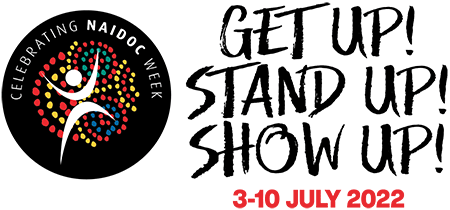 NAIDOC Week is celebrated by local community events taking place across Australia.
NAIDOC Week is celebrated by local community events taking place across Australia.
You can get involved and join in too, just
search for a local event where you can share in the celebrations.
60 seconds with...
 Name: Geraldine Wilson
Name: Geraldine Wilson
Role: Executive Director, Centre for Aboriginal Health
Now, let’s get to know you a little better…
What are three words your family and friends would use to describe you? Loyal, determined, competitive.
Last great TV show or movie you watched? Peaky Blinders. I am looking forward to getting into the next season which has just started. I’m also a Game of Thrones tragic and am looking forward to watching House of the Dragon, the prequel to Game Of Thrones.
Favourite book? The Handmaids Tale and the Long Walk to Freedom, Nelson Mandela.
If you could learn a new skill, what would it be? To learn a new language, particularly Bundjalung.
If you’re cooking dinner, what will everyone be eating? Dinner in our house is quite a production. Most nights I will do 4-5 different meals to cater for likes, dislikes and food intolerances etc. Meals usually will include salmon, steak, kangaroo, pasta, 3 different rices and vegetables. I’m probably my own worst enemy but I kind of find it relaxing.
Any hidden talents? Not really….I am trying to master playing a Nirvana song on guitar at the moment. My 15 year old daughter is teaching me and I’m not very good, but aspire to be 😊
Protect your mob and bub this winter
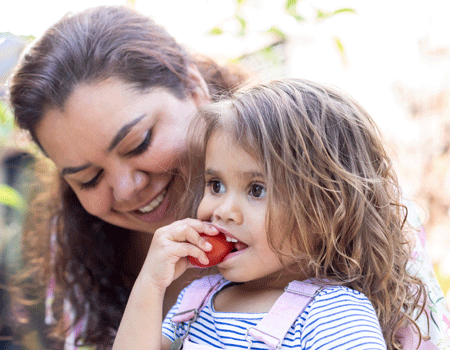 Flu vaccination rates among Aboriginal and Torres Strait Islander people, particularly among those aged six months to five years, were tracking well in 2020. This year rates are just under 20 per cent less than they were in 2020, with only close to 15 per cent of Aboriginal and Torres Strait Islander children aged six months to five years vaccinated against flu so far.
Flu vaccination rates among Aboriginal and Torres Strait Islander people, particularly among those aged six months to five years, were tracking well in 2020. This year rates are just under 20 per cent less than they were in 2020, with only close to 15 per cent of Aboriginal and Torres Strait Islander children aged six months to five years vaccinated against flu so far.
We're encouraging all mob, aged six months and over, to get the flu vaccine to boost immunity this winter season.
While the free flu vaccination program in NSW has now been
extended until 17 July 2022, it is important to remember all Aboriginal and Torres Strait Islander people aged six months and over are eligible for a free flu vaccine beyond this date from their local GP or Aboriginal Medical Service.
Encourage your patients to have a yarn with their GP, pharmacist, Aboriginal Medical Service or Aboriginal Health Worker now if they have questions about the flu vaccine.
For more information on the free flu vaccination, visit
nsw.gov.au
Aboriginal artefacts uncovered
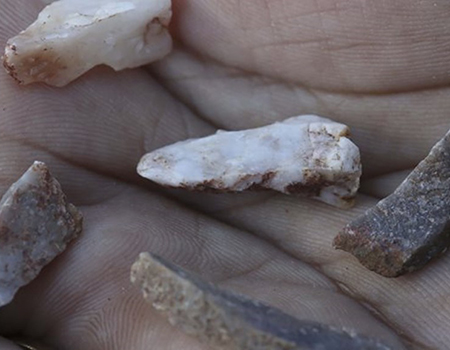 Thousands of culturally significant Aboriginal stone artefacts discovered at the site of the $250 million Griffith Base Hospital redevelopment have been presented to Griffith Local Aboriginal Land Council.
Thousands of culturally significant Aboriginal stone artefacts discovered at the site of the $250 million Griffith Base Hospital redevelopment have been presented to Griffith Local Aboriginal Land Council.
The artefacts were uncovered during archaeological investigations as part of planning for hospital redevelopment. An initial archaeological exploration located 271 stone artefacts in May 2020, and a subsequent operation in November 2020 led to the discovery of over 3000 artefacts.
The artefacts were mostly found in gravels believed to have been brought to the health campus for landscaping activities in previous years.
The archaeological find is an important discovery for the Aboriginal community and the history of Griffith.
Watch more
Art creating a tranquil space at Westmead Hospital
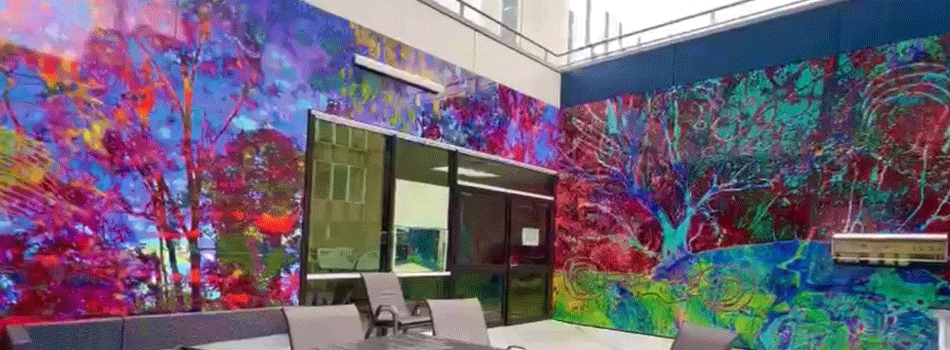
Two vibrantly coloured murals now wrap the walls of the outdoor balcony of Westmead Hospital’s Intensive Care Unit waiting room.
Entitled Ngununy, the Flying Fox Portal and Delta Tree Portal installations were created using a lexicon of symbols widely shared among First Nations Australians to bring a healing design and natural themes to the high-traffic rest area.
This art project was developed under the Mindfulness Art Portal which brings together works by artist facilitator Martha Jabour in collaboration with medical and health staff and the local community.
Digitally illustrated by designer Jim Paton, the stunning Ngununy was co-funded through the Australia Council for the Arts and by the renowned Goh family.
The drawings were developed in consultation with Western Sydney Local Health District Aboriginal Liaison Officer and proud Anaiwan woman from the New England Tablelands township of Armidale, Narelle Holden, proud Sydney-based Gumbaynggirr, Bundjalung and Yuin woman, Kerry Kelly and the Anaiwan people at Westmead and Auburn Hospitals.
National Sorry Day and Reconciliation Week
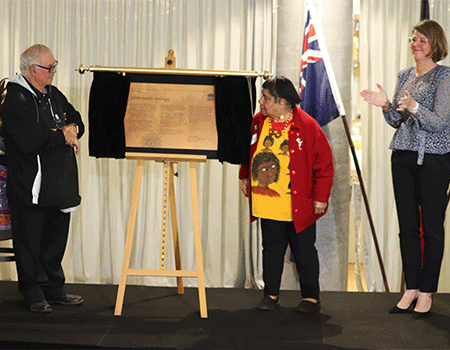 The NSW Ministry of Health acknowledged National Sorry Day on 26 May, with an emotional and moving event at 1RR, St Leonards. Many Survivors of the Stolen Generations were in attendance to hear the heartfelt apology on behalf of NSW Health by its Secretary, Susan Pearce.
The NSW Ministry of Health acknowledged National Sorry Day on 26 May, with an emotional and moving event at 1RR, St Leonards. Many Survivors of the Stolen Generations were in attendance to hear the heartfelt apology on behalf of NSW Health by its Secretary, Susan Pearce.
For the first time, NSW Health made this formal apology on behalf of its hospitals and institutions for their historical role in these unacceptable practices, including the removal of Aboriginal babies and children from their families.
The event commenced with an emotional Welcome to Country and a one minute silence to pay respect to the Survivors. A smoking ceremony was followed by a rousing performance on the yidaki. Uncle Michael ‘Widdy’ Welsh from Kinchela Boys Home and Aunty Valerie LInow from Cootamundra Girls Home then spoke about how their personal experiences had impacted their lives and those closest to them. Uncle Michael and Aunty Linow then unveiled the plaque recognising the formal Apology from NSW Health.
It is estimated that as many as 1 in 10 Aboriginal children in Australia were removed from their families between 1910 and 1970. The event commemorated the Stolen Generations, their families and communities, remembering their resilience, and honouring their strength and survival.
The history and lived experience of Stolen Generations Survivors can be confronting, but by recognising this past trauma we can contribute to the important cultural safety work being done across the public sector.
You can read more on the commemoration on the
NSW Health website.
NSW respiratory surveillance report
The latest
NSW respiratory surveillance report - COVID-19 and Influenza is now available:
In the week ending 25 June 2022:
COVID-19 summary
- COVID-19 transmission in the community remains high with a slight increase in the number of notified cases in the last week. Reported rates of COVID-19 are likely to underestimate true incidence in the community due to a decrease in PCR testing and the use of self-reported rapid antigen testing (RATs).
- PCR testing for COVID-19 has increased, with 194,396 PCR tests reported this week, a 7% increase compared to the previous week. The proportion of PCR tests that were positive for COVID-19 has increased from 13% to 16%.
- 529 people with COVID-19 were admitted to hospital and 56 were admitted to ICU this week. The seven-day rolling average of daily hospital admissions decreased to an average of 76 daily admissions from 86 last week and ICU admissions increased to an average of eight daily admissions up from seven last week. Hospital admissions include people with COVID-19 who are admitted for other reasons.
- There were 104 COVID-19 deaths reported this week. Of these, all were eligible for a third dose of a COVID-19 vaccine but only 72 (69%) had received a third dose. two of the deaths reported were in people aged under 65 years. Deaths may not have occurred in the week in which they were reported.
- The Omicron variant (B.1.1.529) is currently the dominant COVID-19 variant circulating in the NSW community, with BA.2 the predominant sub-lineage. The proportion of specimens likely to be either the BA.4 or BA.5 sub-lineage has increased in the last week to around 35% compared to 32% at the end of the previous week.
- It is expected that BA.4 and BA.5 will become the dominant strain and will likely be associated with an increase in infections in the coming weeks. There is no evidence of a difference in disease severity but this is being closely monitored. The timing of any increase in COVID-19 infections as a result of the BA.4 and BA.5 sub-lineages will depend on a combination of factors, including the growth advantage, immunity levels in the population, and environmental and behavioural factors (e.g. social mixing, isolation when unwell).
- Coinfections with multiple respiratory viruses have been reported particularly in children.
Influenza summary
- Hospital and laboratory surveillance continues to show a high level of influenza activity across NSW.
- Notifications of influenza cases decreased this week. The recent trend in reported influenza cases suggests that the influenza season has peaked; however, there could be subsequent peaks given the early start to the 2022 influenza season. Influenza vaccination is strongly advised.
- Hospitalisations and the percentage of tests that are positive are the most useful indicators for comparison of influenza activity across years. These indicators are not impacted by overall testing in the community, which is currently elevated due to increased respiratory virus testing.
- Of the 70,458 tests conducted for influenza at sentinel laboratories, the proportion of positive tests decreased to 9% compared to 15% in the previous week.
- Emergency department presentations for ‘influenza-like illness’ (ILI) requiring an admission have decreased to 163 compared to 218 admissions in the previous week. 16% of all ILI emergency department presentations required a hospital admission this week, which is a slight increase from 15% in the previous week. 65 years and over (52%), 35-64 years old (19%) and children aged 0-4 years (12%).
- Influenza A is the dominant circulating strain.
Excellence in Aboriginal Healthcare Award winners
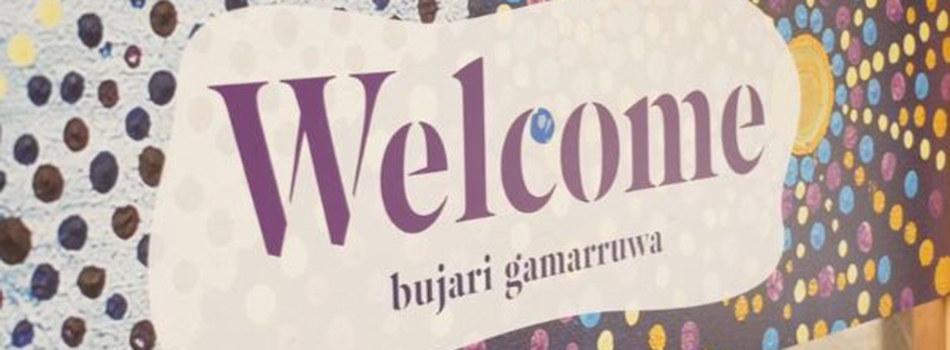
Watch video
The Stay'n Deadly &Stay'n In project was awarded winner for Excellence in Aboriginal Heathcare in the NSW Health Awards 2021.
The project was a collaborative endeavour between the Emergency Department and Aboriginal Health Unit at St Vincent's Hospital, aimed specifically at improving the quality of care for Aboriginal and Torres Strait Islander patients.
The goals were to decrease the rate of Aboriginal and Torres Strait Islander patients who "Did not wait" (DNW) for treatment or, "Left at their own risk" (LAOR). A "flexi-clinic" model introduced has seen a significant reduction in the rate of LAOR and DNW with the average rate falling from 19.5 per cent to 5.2 per cent of presentations, an initiative sustained for over 12 months since the program began.
You can read more about our finalists improving Aboriginal Healthcare on the
NSW Health website.
Aboriginal Nurse of the Year
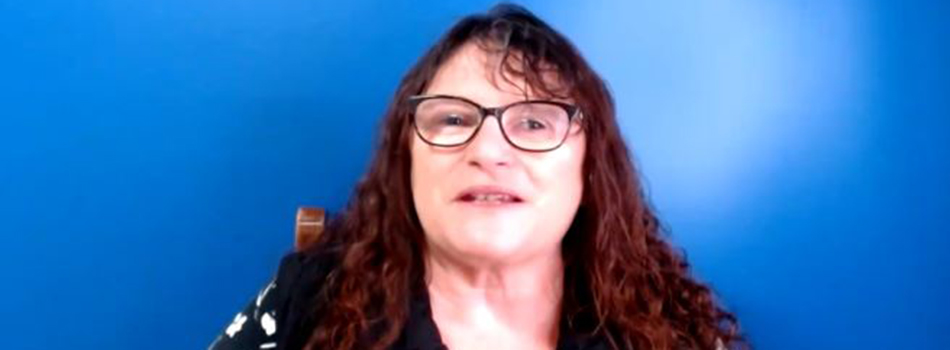
Watch video
Dawn Evans, an Enrolled Nurse at Wilcannia Health Service was awarded Aboriginal Nurse of the Year in the NSW Health Excellence in Nursing &Midwifery Awards 2021. The Excellence in Nursing and Midwifery Awards provide an opportunity to showcase and celebrate the incredible work nurses and midwives do every day, in various settings, across the state.
Dawn was recognised for demonstrating exceptional commitment to the provision of quality, safe, compassionate and culturally appropriate health care for Aboriginal and Torres Strait Islander peoples and communities.
Dawn is committed to improving care and advocating for the delivery of better healthcare services to Aboriginal and Torres Strait Islander peoples and communities.
Quick news
Aboriginal high school training program helps western Sydney Close the Gap
Aboriginal and Torres Strait Islander high school students from western Sydney are launching their health careers thanks to a
new training and career partnership.
Western Sydney Local Health District (WSLHD) has teamed up with Indigenous Allied Health Australia (IAHA) Group Training to provide a school-based traineeship program.
The first intake of 10 students signed up this year to undertake a Certificate III in Allied Health Assistance while completing their year 11 &12 studies, gaining relevant employability skills and workforce experience with both IAHA and WSLHD.
Aboriginal Mental Health and Wellbeing Plan launched
Southern NSW have launched their first Aboriginal Mental Health and Wellbeing Plan. This is the first time the District has a focused, strategic direction for the mental health and wellbeing of Aboriginal people.
The Aboriginal Mental Health and Wellbeing Plan is designed to improve mental health and wellbeing outcomes for local Aboriginal people and families. It reflects the knowledge, experiences, and priorities of Southern’s communities and their commitment to providing culturally safe, trauma-informed, and better-connected care.
The plan has been developed with Aboriginal staff and consumers, and in partnership with local Aboriginal health services
Complete your Respecting the Difference Training
Don't forget to complete your mandatory Respecting the Difference Training on
My Health Learning.
We asked Wayne Dargan, Aboriginal Employment Advisor at Sydney Children's Hospitals Network, why is it important to complete the Respecting the Difference training?
"In my view it’s important to educate, empower and share our culture - to give our non-identified staff information and skills to help them build relationships and understand our Aboriginal patients, community and staff while working together to achieve positive change."
Celebrating 25 years of culturally sensitive care
The Aboriginal Health Unit at South Eastern Sydney Local Health District has proudly been providing leadership, advocacy, cultural guidance, and strategic advice across the district for 25 years.
A special celebration was recently held to acknowledge the significant milestone as Tobi Wilson, Chief Executive thanked the hardworking unit.
"I look forward to continuing to learn from local leaders and improving our best efforts to support health and wellbeing for local Aboriginal communities."
Aboriginal Allied Health Professional of the Year
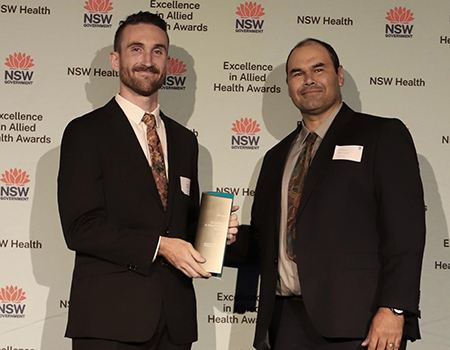 Cameron Edwards, a physiotherapist at the Blacktown and Mount Druitt Hospitals (BMDH), was awarded Aboriginal Allied Health Professional of the Year at the Excellence in Allied Health Awards 2021.
Cameron Edwards, a physiotherapist at the Blacktown and Mount Druitt Hospitals (BMDH), was awarded Aboriginal Allied Health Professional of the Year at the Excellence in Allied Health Awards 2021.
Cameron identified concerning issues regarding the experience of Indigenous physiotherapy students. He took the initiative to collaborate with the University of Sydney, his manager and the broader BMDH Physiotherapy team, to implement student placements at Blacktown Hospital that are culturally responsive and safe for Indigenous students.
Cameron has commenced planning and negotiations to embark on a PHD research journey with a focus on services for Aboriginal and Torres Strait Islander people.
During the COVID-19 pandemic, Cameron trained as an Allied Health COVID-19 Vaccinator and in addition to working in the mainstream vaccination hubs, attended the Aboriginal and Torres Strait Islander outreach vaccination clinics which the local Aboriginal community loved, demanding his return for their second jabs.
Multicultural resources
-
Translated resources - When should I get a COVID-19 test? Who is at higher risk of severe illness?
- Multicultural Health Communication Service
Youth Ambassadors program:
- Indira
- Vince
- Multicultural Youth COVID-19 Ambassadors welcomed by the Minister for Health, Brad Hazzard
- Multicultural Media Online Conference with Minister for Health Brad Hazzard on 2022-23 NSW Budget
-
Palliative care
Improving chronic kidney disease care
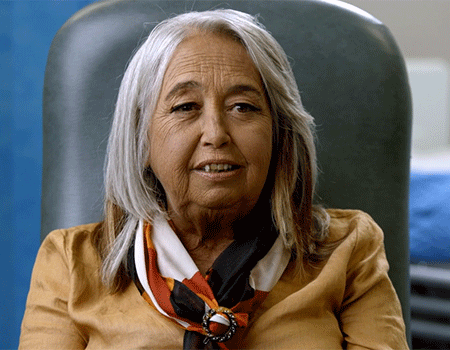 The Agency for Clinical Innovation’s Aboriginal Chronic Conditions Network (ACCN) has published a
series of videos to support clinicians caring for Aboriginal people with chronic kidney disease.
The Agency for Clinical Innovation’s Aboriginal Chronic Conditions Network (ACCN) has published a
series of videos to support clinicians caring for Aboriginal people with chronic kidney disease.
The videos aim to provide education on chronic kidney disease, empower Aboriginal community members, and enhance the cultural capability of health staff.
Aunty Liz (pictured) shares her lived experience with chronic kidney disease, explaining the healthcare-related experiences of Aboriginal people, including her journey of racism, mistrust, empowerment and taking back control.
The ACCN works to improve the experience and delivery of healthcare for Aboriginal people with chronic conditions in NSW.
To achieve this, the ACCN supports the process of evidence-based reform by promoting and implementing new initiatives, frameworks and models of care. It does this by enhancing and supporting the integration of care for Aboriginal communities accessing chronic care services in NSW.
New clinic tackling gap in Indigenous dental health
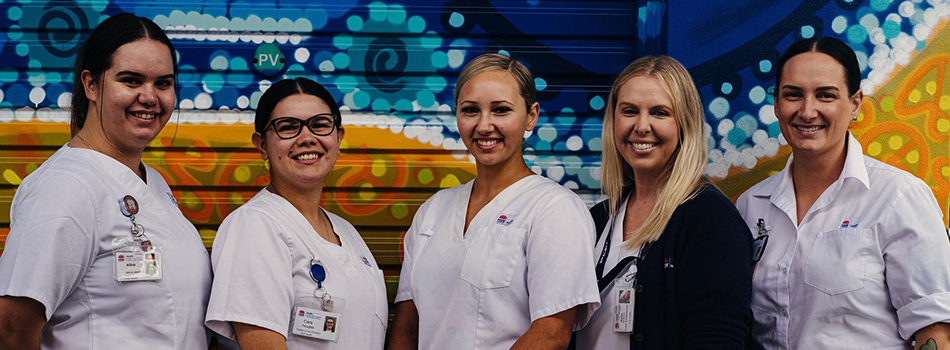 Staff and community representatives officially opened the state-of-the-art Awabakal Dental Clinic located in Hamilton this year, providing services to the local First Nations community.
Staff and community representatives officially opened the state-of-the-art Awabakal Dental Clinic located in Hamilton this year, providing services to the local First Nations community.
Launched in partnership with Hunter New England Health, the clinic will provide bulk-billed dental services to the local Aboriginal community.
The new-look facility has been custom-built to meet local demand. It’s also resulted in a number of career pathways for young Indigenous people.
Dr Lanny Chor, Clinical Director for Hunter New England Oral Health said, “There’s a considerable link between good oral hygiene and overall health – and in this partnership, there’s an opportunity to integrate dental health with the wellbeing of the whole person0."
“I’m pleased that we’re taking active steps to close the gap and make dental care more accessible for more Indigenous Australians. I’d like to thank Awabakal for trusting us to look after its dental health,” said Dr Chor.
From the Critical Intelligence Unit
In the past weeks, the Critical Intelligence Unit (CIU) Evidence Digest features:
The
Evidence Digest is available via the Agency for Clinical Innovation (ACI) website. To receive the Digest on Friday mornings, sign-up by emailing
Critical Intelligence Unit.
The
Critical Intelligence Unit continues to provide:
- Living evidence tables capturing emerging evidence on vaccines, variants of concern, transmission, post-acute sequelae of COVID-19 (long COVID), surgery, and rapid testing.
- An integrated dashboard to support risk monitoring in healthcare settings.
Quick links
Check in is sent directly to all employees across the health system to keep you informed of important updates.
Email story ideas, suggestions or feedback.